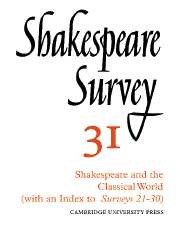Book contents
- Frontmatter
- The Ancient World in Shakespeare: Authenticity or Anachronism? A Retrospect
- ‘A Piece of Skilful Painting’ in Shakespeare’s Lucrece
- Philomel in Titus Andronicus and Cymbeline
- Apuleius and the Bradleian Tragedies
- ‘The Choice of Hercules’ in Antony and Cleopatra
- Structure, Inversion, and Game in Shakespeare’s Classical World
- Truth and utterance in The Winter’s Tale
- Adumbrations of The Tempest in A Midsummer Night’s Dream
- The Old Honor and the New Courtesy: 1 Henry IV
- Henry V: the Chorus and The Audience
- ‘The Devil’s Party’: Virtues and Vices in Measure for Measure
- Shakespeare and the Healing Power of Deceit
- Shakespeare’s Man Descending a Staircase: Sonnets 126 to 154
- A New View of Bankside
- Comedies and Histories at Two Stratfords, 1977
- Tamburlaine the Great Re-discovered
- The Year's Contributions to Shakespearian Study 1 Critical Studies
- 2 Shakespeare’s Life, Times, and Stage
- 3 Textual Studies
- General Index to Surveys 22–30
- Index
- Plate Section
The Year's Contributions to Shakespearian Study 1 - Critical Studies
Published online by Cambridge University Press: 28 March 2007
- Frontmatter
- The Ancient World in Shakespeare: Authenticity or Anachronism? A Retrospect
- ‘A Piece of Skilful Painting’ in Shakespeare’s Lucrece
- Philomel in Titus Andronicus and Cymbeline
- Apuleius and the Bradleian Tragedies
- ‘The Choice of Hercules’ in Antony and Cleopatra
- Structure, Inversion, and Game in Shakespeare’s Classical World
- Truth and utterance in The Winter’s Tale
- Adumbrations of The Tempest in A Midsummer Night’s Dream
- The Old Honor and the New Courtesy: 1 Henry IV
- Henry V: the Chorus and The Audience
- ‘The Devil’s Party’: Virtues and Vices in Measure for Measure
- Shakespeare and the Healing Power of Deceit
- Shakespeare’s Man Descending a Staircase: Sonnets 126 to 154
- A New View of Bankside
- Comedies and Histories at Two Stratfords, 1977
- Tamburlaine the Great Re-discovered
- The Year's Contributions to Shakespearian Study 1 Critical Studies
- 2 Shakespeare’s Life, Times, and Stage
- 3 Textual Studies
- General Index to Surveys 22–30
- Index
- Plate Section
Summary
An appropriate book with which to begin is one concerned with Shakespeare’s origins, Emrys Jones’s challenging study of Titus Andronicus and the early histories, which provides rich pickings for critical discussion. It may claim originality in several respects, proposing that the significance of the mystery cycles for Shakespeare’s dramaturgy is far greater than has hitherto been acknowledged, that Shakespeare’s learning, product of Erasmian humanism, is still under-estimated, in particular his knowledge, via Latin translations, of Greek tragedy, and that formative influences may exert themselves not only through specific and readily identifiable debts, but also through broad situational features and even tone. Although presumptively likely, these positions are not easily susceptible of proof. The case for the possible influence of Euripides’s Hecuba on Titus Andronicus rests upon circumstantial evidence and similarity of ‘fundamental structure’, but the similarity is so broad as to be inconclusive. Much the same may be said of the alleged influence of deep-seated memories of the passion sequence of the mystery cycles, particularly on episodes in the Henry VI plays, although here the detail is more persuasive. To speak more generally, while the creative imagination draws both arcanely and manifestly upon its store of experienced art, it also draws upon direct experience.
- Type
- Chapter
- Information
- Shakespeare Survey , pp. 163 - 177Publisher: Cambridge University PressPrint publication year: 1979

